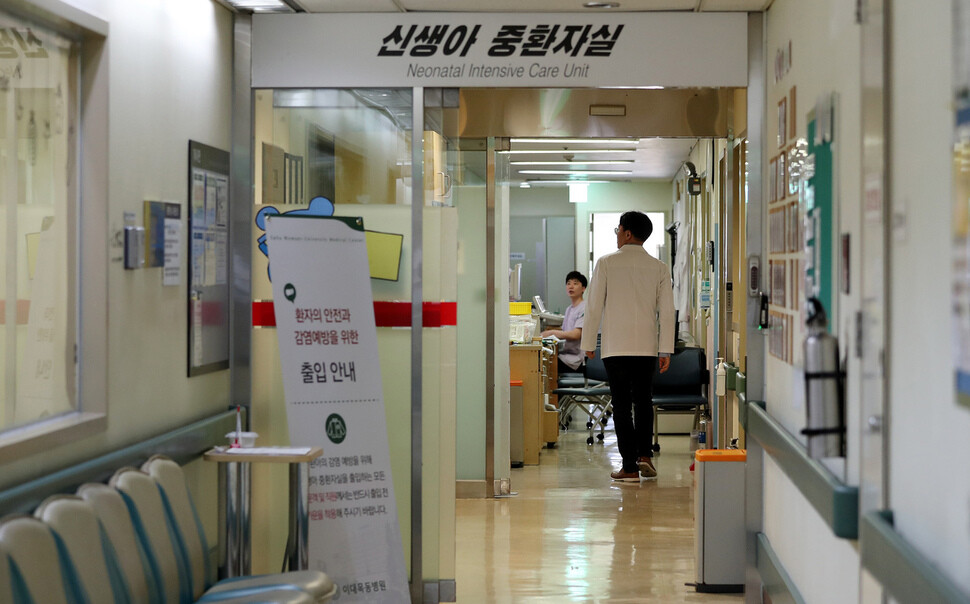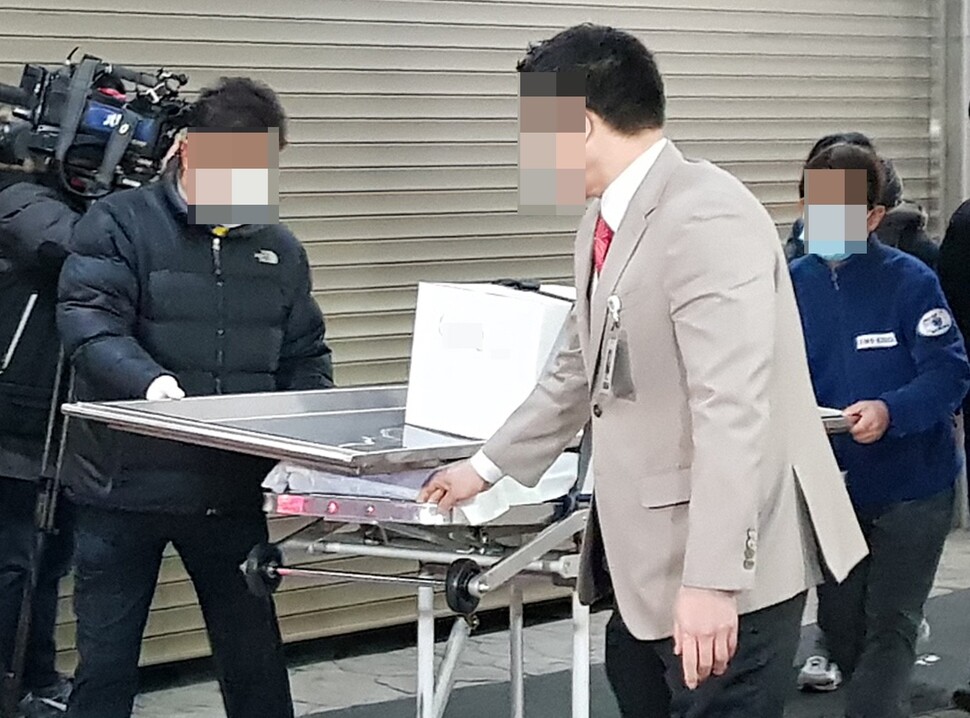hankyoreh
Links to other country sites 다른 나라 사이트 링크
[Editorial] Thorough investigation needed to uncover causes of death for newborn babies

Tears streamed down the father’s face as he tightly clutched a tiny white box with a baby inside. What guardian could have taken it – following days of worry when his child was born premature, after its sudden death in the hospital he had placed his trust in, and then finally after being forced to retrieve the body following an autopsy? The investigation into the cause of death and the question of the hospital’s fault must be swift and thorough.
What happened on Dec. 16 in the neonatal intensive care unit of Ewha Womans University Mokdong Hospital (a tertiary hospital) is unimaginable. The National Forensic Service performed autopsies on Dec. 18 to determine the reason four newborn infants in the unit died in the space of 81 minutes. The Korea Centers for Disease Control & Prevention (KCDC) continued its epidemiological study for a second straight day, but it remains too soon to reach a definite answer. With the KCDC study reportedly finding evidence that day that three of the four babies were infected by a Gram-negative bacterium, we can’t help suspecting some kind of infection at the hospital.
Gram-negative bacteria can cause secondary infections even in adult patients with compromised immune systems, including ventilator-associated pneumonia and urinary tract infections. They would have been all the more deadly for premature infants born before the 37th week of pregnancy. Hospital-based infections were also the biggest issue during the MERS scare two years ago. That said, it is difficult to reach a conclusion on any one factor that would have led to all four deaths occurring around the same time – including one infant who was not found to be infected. The investigators need to consider every possibility, including dosage errors and incubator malfunctioning.
Even in light of the situation’s irregularity, the response from the hospital has been incomprehensible. The first report was made by one of the guardians to police after two deaths had already occurred; it was also the police, not the hospital, who alerted the public health center first. The hospital also staged a press conference before it had even explained the situation to the panicked parents.

But what is most difficult to fathom is how an NICU, where even the tiniest sign of danger to a patient needs to be monitored and responded to, could have been unaware of what was happening until the babies went into cardiac arrest. It’s also the same hospital where two newborns contracted latent tuberculosis last year from an infected nurse; in September, an insect was discovered in fluids being administered to a five-month-old infant there.
As it faces investigation by public health authorities, Ewha Womans University Mokdong Hospital needs to be prepared to shut its doors if it is found to be at fault. The authorities should also use this as an occasion to review systems not just at that hospital but at all of South Korea’s general hospitals. It’s the least they can do for these young lives lost so soon after they had begun.
Please direct questions or comments to [english@hani.co.kr]

Editorial・opinion
![[Column] Will Seoul’s ties with Moscow really recover on their own? [Column] Will Seoul’s ties with Moscow really recover on their own?](https://flexible.img.hani.co.kr/flexible/normal/500/300/imgdb/original/2024/0513/5917155871573919.jpg) [Column] Will Seoul’s ties with Moscow really recover on their own?
[Column] Will Seoul’s ties with Moscow really recover on their own?![[Column] Samsung’s ‘lost decade’ and Lee Jae-yong’s mismatched chopsticks [Column] Samsung’s ‘lost decade’ and Lee Jae-yong’s mismatched chopsticks](https://flexible.img.hani.co.kr/flexible/normal/500/300/imgdb/original/2024/0512/3017154788490114.jpg) [Column] Samsung’s ‘lost decade’ and Lee Jae-yong’s mismatched chopsticks
[Column] Samsung’s ‘lost decade’ and Lee Jae-yong’s mismatched chopsticks- [Correspondent’s column] The real reason the US is worried about Chinese ‘overcapacity’
- [Editorial] Yoon’s gesture at communication only highlights his reluctance to change
- [Editorial] Perilous stakes of Trump’s rhetoric around US troop pullout from Korea
- [Guest essay] Preventing Korean Peninsula from becoming front line of new cold war
- [Column] The state is back — but is it in business?
- [Column] Life on our Trisolaris
- [Editorial] Penalties for airing allegations against Korea’s first lady endanger free press
- [Editorial] Yoon must halt procurement of SM-3 interceptor missiles
Most viewed articles
- 1[Column] Samsung’s ‘lost decade’ and Lee Jae-yong’s mismatched chopsticks
- 2Ado over Line stokes anti-Japanese sentiment in Korea, discontent among Naver employees
- 3US has always pulled troops from Korea unilaterally — is Yoon prepared for it to happen again?
- 4Korean opposition decries Line affair as price of Yoon’s ‘degrading’ diplomacy toward Japan
- 5‘Free Palestine!’: Anti-war protest wave comes to Korean campuses
- 6[Photo] Korean students protest US complicity in Israel’s war outside US Embassy
- 7[Column] Will Seoul’s ties with Moscow really recover on their own?
- 8Shuttering all foreign worker support centers, S. Korea leaves migrants to fend for themselves
- 9Korean auto industry on edge after US hints at ban on Chinese tech in connected cars
- 10Korean med schools swallow bitter pill by pushing back classes to avoid mass flunking